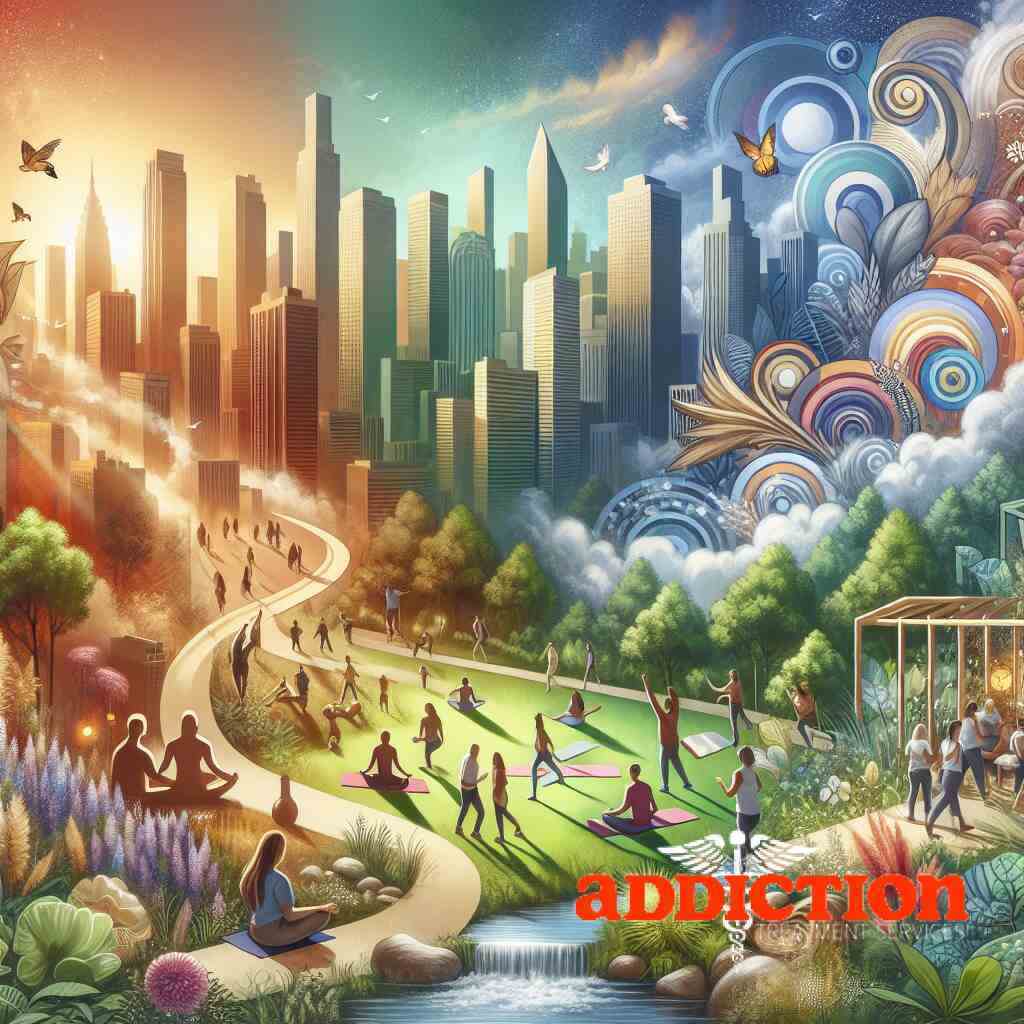 Posted On: 07/17/2025
Posted On: 07/17/2025Unveiling the New York Recovery Landscape
Mapping the Empire State’s Addiction Treatment Services
Mapping the vast network of addiction treatment near New York involves a multifaceted approach. In New York, an array of treatment services offers both traditional and cutting-edge practices aimed at addressing addiction at its roots. The city’s treatment centers are strategically located to cater to diverse demographics, ensuring accessibility for all. These centers provide various programs ranging from inpatient rehabilitation to outpatient therapy, ensuring flexibility and comprehensive care to suit individual needs. The seamless integration of community support networks further enhances these services, creating robust recovery paths for those undertaking their journey to sobriety.
Understanding the Complexities of Substance Use Disorders
Substance use disorders are multifaceted, impacting individuals on physical, emotional, and socio-economic levels. Each case of addiction is unique, requiring a tailored approach to treatment. Factors such as genetic predisposition, environmental influences, and co-occurring mental health disorders complicate the recovery process. Effective treatment in New York involves a holistic understanding of these complexities, integrating personalized care plans that address both the symptoms and the underlying causes of addiction. The intertwining of therapy, medication, and support services aims to restore balance in the lives of those affected, promoting sustainable recovery outcomes.
Navigating New York’s Regulatory Framework for Treatment
Navigating the regulatory framework for addiction treatment in New York presents a challenge, but it’s crucial for maintaining high standards of care. The state’s laws and policies are designed to protect patients while ensuring that centers offer ethical and evidence-based treatments. Certification and licensing regulations ensure that only qualified professionals provide services, while patient confidentiality laws safeguard personal information. Understanding these regulations is essential for both providers and recipients of treatment, ensuring compliance and optimal care outcomes. This regulatory landscape requires constant adaptation, as evolving societal needs drive changes in treatment protocols and philosophies.
Cutting-Edge Practices in Addiction Recovery
Integrating Holistic Approaches with Traditional Methods
In the realm of addiction treatment, New York stands out for its innovative blend of holistic addiction treatment on Long Island with conventional methodologies. This integration ensures a comprehensive treatment strategy addressing both mind and body. Engaging therapies such as yoga, meditation, and nutritional guidance complement traditional procedures like cognitive-behavioral therapy. By merging these practices, treatment centers in New York offer a balanced approach that targets not just the symptoms but the core issues of addiction. This synergy fosters a nurturing environment conducive to long-term recovery, offering individuals personalized pathways to health and well-being.
Harnessing Medication-Assisted Treatment for Effective Outcomes
Medication-assisted treatment (MAT) is a cornerstone in New York’s addiction recovery tactics, seamlessly integrated to enhance treatment efficacy. By combining behavioral therapies with medications, MAT addresses withdrawal symptoms and reduces cravings, facilitating smoother transitions to sobriety. This approach is tailored to meet individual needs, considering factors like drug dependence type and personal health background. New York’s commitment to MAT underscores its dedication to reducing relapse rates and improving recovery outcomes, allowing patients a realistic chance at lasting sobriety through scientifically-supported treatments.
Enhancing Recovery through Behavioral Health Services
In New York, behavioral health services in NYC play a pivotal role in the recovery journey of individuals battling addiction. These services encompass a wide array of therapeutic techniques aimed at reshaping behaviors and fostering mental wellness. Cognitive-behavioral therapy, motivational interviewing, and contingency management are among the strategies utilized to help patients navigate the complexities of addiction. By addressing behavioral health alongside substance use disorders, New York’s treatment centers provide a nuanced, comprehensive care framework that targets underlying psychological issues. This dual focus not only aids in substance abuse recovery but also promotes healthier lifestyles and improved mental health outcomes.

Community and Support Mechanisms
The Role of Peer Support Groups in Sustaining Recovery
Peer support groups play a vital role in the ecosystem of recovery programs in NYC. These groups, including AA meetings in New York, offer a safe space for individuals to share their experiences and challenges, fostering a sense of community and understanding. This camaraderie is crucial for many in maintaining sobriety as it provides emotional support and practical guidance from those who have walked the same path. By participating in regular meetings, individuals can reinforce their commitment to recovery and learn valuable coping strategies. The tangible sense of belonging and accountability cultivated in these forums often accelerates the healing process, making peer support groups a cornerstone of sustained recovery efforts.
Barriers and Solutions to Accessing Treatment Resources
Although New York is rich in treatment resources, accessing them can pose challenges due to socio-economic barriers. Many individuals encounter difficulties such as lack of insurance, inadequate transportation, and limited information about available outpatient care in Queens. To bridge these gaps, community organizations and treatment centers are implementing innovative solutions including telehealth options and sliding scale payment plans. Advocacy for policy change also plays a significant role in dismantling these obstacles, striving for comprehensive insurance coverage that includes all facets of addiction treatment. Additionally, educational outreach programs are crucial, increasing awareness and providing guidance to individuals navigating the maze of substance abuse recovery in the Bronx, thus enhancing accessibility for all seeking help.
Dual Diagnosis Treatment: Addressing Co-Occurring Disorders
In the context of holistic recovery, addressing co-occurring disorders through dual diagnosis treatment near NYC is essential. Dual diagnosis refers to the simultaneous treatment of addiction and mental health disorders, such as depression or anxiety, which often intertwine, creating a complex recovery scenario. Specialized programs in New York offer integrated treatment plans that cater to both the psychological and physical facets of substance use disorders, recognizing that untreated mental health conditions can significantly hinder recovery efforts. By coordinating behavioral therapies with medical interventions, treatment centers aim to provide a balanced, multifaceted approach, therefore improving long-term outcomes for patients. This comprehensive treatment strategy not only aids in substance misuse recovery but also significantly enhances the overall quality of life for individuals battling these dual challenges.
Pioneering Techniques in Detoxification and Relapse Prevention
Innovations in New York Detoxification Practices
In the fast-paced world of addiction treatment, New York is at the forefront with its innovative detoxification practices. The city’s approach combines traditional detox methods with cutting-edge techniques to ensure the safety and comfort of individuals undergoing this critical first step in their recovery journey. Advanced medical detox protocols are utilized to manage withdrawal symptoms effectively, minimizing discomfort and risk. In recent years, there has been a significant focus on integrating holistic practices, such as nutritional support and acupuncture, into detoxification programs. These innovative detox tactics aim to promote physical healing and prepare individuals for the subsequent stages of treatment, setting a strong foundation for their sobriety journey.
Designed Strategies for Relapse Prevention in NYC
Relapse prevention is a crucial component of addiction recovery, and New York City employs meticulously designed strategies to tackle this challenge head-on. Treatment centers across the city implement individualized relapse prevention plans that focus on identifying and addressing triggers, stressors, and high-risk situations. Evidence-based techniques such as cognitive-behavioral therapy and motivational interviewing are central to this process, empowering individuals to develop coping mechanisms and enhance their resilience. The city’s robust relapse prevention strategies in NYC also incorporate family involvement and support systems, recognizing the importance of an inclusive recovery environment. By leveraging a comprehensive and proactive approach, New York is committed to reducing relapse rates and fostering sustainable recovery.
Utilizing Intensive Outpatient Programs for Sustained Recovery
Intensive outpatient programs (IOPs) in New York offer a powerful resource for individuals seeking sustained recovery without the need for inpatient care. These programs provide a blend of structured therapy sessions and flexible scheduling, making them ideal for individuals balancing recovery with daily responsibilities like work or family commitments. New York’s IOPs emphasize a continuum of care, featuring a wide range of services such as individual counseling, group therapy, and family therapy to address different aspects of substance use disorders. By focusing on skill development, relapse prevention, and community support, intensive outpatient programs in NY play a pivotal role in maintaining long-term sobriety and promoting overall wellness. This strategic utilization of IOPs offers an effective pathway for individuals striving for a balanced and healthy lifestyle during their recovery process.

The Road Ahead: Future Trends in New York’s Addiction Treatment
Exploring the Future of Substance Misuse Solutions
New York’s landscape of addiction treatment continues to evolve, with promising future trends aimed at enhancing recovery outcomes. As technological advancements permeate healthcare, innovations in telehealth are becoming prevalent, offering increased access to addiction treatment services. This growth allows for remote consultations and therapy sessions, removing geographical barriers and providing more individuals with the ability to seek help. Furthermore, there is a rising interest in personalized treatment plans, utilizing genetic testing to tailor addiction recovery services in NYC precisely to individual needs. Such innovations promise to transform the scope and effectiveness of substance misuse solutions, setting the stage for more comprehensive and successful recovery paths.
Anticipating the Evolution of Mental Health Services
The future of mental health services in New York foresees an essential shift toward integrating mental health seamlessly with addiction treatment. As the understanding of mental health complexities deepens, techniques such as AI-driven assessments are gaining traction to improve diagnostic accuracy and treatment personalization. Community-based mental health services in New York will likely expand, focusing on early intervention and preventive measures. Partnerships between addiction treatment centers and mental health services in New York are expected to strengthen, promoting a holistic approach that considers both mental and physical health. This evolution heralds a more inclusive and supportive treatment environment, paving the way for better patient outcomes.
Capitalizing on Advances in Recovery Support Services
As addiction treatment methodologies progress, there is a concerted effort to capitalize on advances in recovery support services. New York is witnessing an expansion of peer-led initiatives, leveraging the power of community and shared experiences in aiding recovery. Moreover, digital platforms catering to recovery support are on the rise, offering round-the-clock availability and specialized resources. Programs focusing on relapse prevention and skill-building are becoming more sophisticated, incorporating cutting-edge therapies such as virtual reality to simulate real-life scenarios. By embracing these advancements, New York continues to enhance its approach to supporting addiction recovery, offering resilient pathways for individuals striving toward long-term sobriety.
Frequently Asked Questions
Question: What are some of New York’s top addiction treatment tactics, and how do they integrate holistic and traditional methods?
Answer: New York excels in blending holistic and traditional addiction treatment methods to offer comprehensive care. Treatment centers utilize a synergy of yoga, meditation, and nutritional guidance alongside conventional therapies like cognitive-behavioral therapy and motivational interviewing. This integrated approach addresses both mental and physical health, promoting sustainable recovery by targeting core issues of addiction. For those seeking holistic addiction treatment New York offers an ideal blend that supports long-term sobriety.
Question: How does medication-assisted treatment impact addiction recovery in New York City?
Answer: Medication-assisted treatment (MAT) is a pivotal component of the addiction recovery process in NYC. By combining FDA-approved medications with behavioral therapies, MAT addresses withdrawal symptoms and reduces cravings, enhancing treatment efficacy. This personalized approach considers individual health backgrounds and addiction types, helping to decrease relapse rates. New York’s dedication to MAT demonstrates its commitment to improving recovery outcomes through scientifically-backed solutions, offering a robust framework for lasting sobriety.
Question: In the article ‘What Are New York’s Top Addiction Treatment Tactics?’ how does peer support contribute to recovery?
Answer: Peer support groups are integral to New York’s addiction recovery landscape as highlighted in the article. These groups, such as AA and NA meetings, provide a safe space for individuals to share experiences and receive support from others in similar situations. The sense of community fostered within these groups is crucial for maintaining sobriety, offering practical coping strategies and emotional support. This camaraderie often accelerates healing, making peer support groups an essential part of the recovery ecosystem in New York.
Question: What are the strategies for relapse prevention in New York, and how effective are they?
Answer: New York employs meticulously designed relapse prevention strategies that focus on individualized care. These strategies identify personal triggers and high-risk situations, employing cognitive-behavioral therapy and motivational interviewing to develop coping mechanisms. The inclusion of family involvement and support systems enhances these efforts by creating a supportive recovery environment. This comprehensive approach has proven effective in reducing relapse rates, making New York a leader in sustainable addiction recovery efforts.
Question: How does New York address the complexities of dual diagnosis treatment?
Answer: Dual diagnosis treatment in New York focuses on the simultaneous management of addiction and co-occurring mental health disorders such as depression or anxiety. Treatment centers offer integrated plans that coordinate behavioral therapies with medical interventions, recognizing that untreated mental health conditions can hinder recovery. This balanced approach not only assists in substance abuse recovery but also significantly improves mental health outcomes and overall quality of life, demonstrating New York’s comprehensive approach to addiction treatment.


